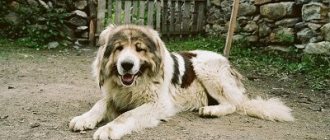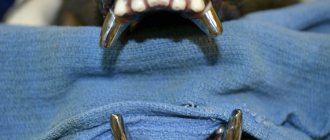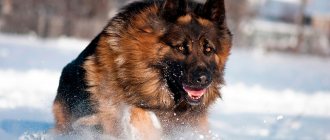Before you decide what to feed your German Shepherd puppy, you need to understand the basics of creating the right diet for the animal.
Your dog should eat only special food prepared for him, taking into account his needs, age and breed predispositions. To create a competent diet, you will need to study the list of approved products and recommended feeds, this will be discussed today.
And to make preparing food for your pet even easier, we recommend purchasing Bosch household appliances.
Principles of feeding babies and adults
Feeding your German Shepherd puppy should be strictly on a schedule. Small puppies eat on a schedule. The importance of nutrition in the first year of life, especially in the first 4 months, is that the puppy is growing, and certain nutritional elements are required for growth. It is not always possible to calculate them correctly on your own.
It is important to remember that overfeeding a dog has the same negative impact as underfeeding. If the baby is thin, does not gain weight, or, on the contrary, is too dense, it is worth reconsidering his feeding, otherwise there is a risk of developing various diseases and pathologies.
- It’s easier with adults; they eat 2 times a day. Their body has already grown and formed, it only needs maintenance and correct calculation of the diet.
A lack of nutrients will directly manifest itself in problems with hair, skin, teeth and pathology of internal organs.
All additional vitamin and mineral complexes can be selected only based on the existing diet, as well as age, physical activity and general health.
Necessary feeding
In order for a growing puppy’s body to function normally, you must feed your pet properly either with homemade food or dry food. But no matter how hard you try, you can’t get by on food alone, especially if you skimp on the quality of feed.
To maintain the physical development and proper growth of a German Shepherd, you need to add vitamins to the diet not only in natural form, but also in the form of mineral supplements in the form of tablets or powder.
Next, we’ll look at what vitamins and tablets should be given to a puppy and an adult German Shepherd.
Basics and General Guidelines
The diet for a small German Shepherd puppy is maintained for 14 days after arriving at its new home, in the same form as recommended by the breeder. If it is food, then it is necessary to continue feeding it. The change in nutrition will take place gradually, adding a small amount to your usual food.
- The number of feedings per day is from 4 to 5 times, with a time interval of 4 hours.
- One serving - for 1 time, there should be as much food as can be eaten once. Approximate calculation: 100 grams of food per 200 grams of body weight.
- Food should be at a neutral temperature, food from the refrigerator should be warm.
- It is always necessary to supply water;
- Feed the puppy strictly at one chosen time, after he sleeps, immediately take him outside, so he will begin to get used to the toilet.
- The first and last feedings should be at least 6 to 8 hours apart.
- Watch how he eats, what his appetite is, if he doesn’t finish eating, perhaps the portion is too large.
- Place the bowl on a stand so that it is level with your back.
Where to put the bowl
The bowl is located in the place where it is most convenient to eat without distraction, take into account the size of the pet. When the dog grows up, it should fit without problems; the place for food should not be in the aisle.
- It is better to take an adjustable stand - as soon as he grows up, you can increase the height, the same applies to the size of the bowl.
- After feeding, she is removed, washed and put back in her place.
- Place an easy-to-clean rug under the stand to prevent food from flying onto the walls and floor. Hang oilcloth on the wall, it can be easily wiped.
- People in the house eat first, then animals. Dogs eat according to seniority, first the adults and then the puppies.
Feeding frequency and portion size
Feeding frequency is 4 to 5 times a day, at the same time with a break of 4 hours. Adults 2 times a day, calculated based on weight, age and load. Natural nutrition is calculated according to the principle: 30 grams of protein per 1 kg of weight of an adult animal, the rest for porridge and vegetables in a ratio of 10 and 20% of the total volume.
For puppies, food is finely chopped or pureed, liquid or porridge. If it is food, then it must be soaked for the first 3 months. It is better to soak with warm water, do not use boiling water - the nutrients may lose their properties.
The best solution: with warm water, after the child has eaten, fill the food with water in advance, it will swell on its own in 2 - 3 hours.
Essential vitamins
In total, more than 30 types of vitamins are produced for German shepherds, but the most important are groups A, B, C, D, E. Their deficiency is detected most often and leads to serious illnesses; their absence has a particularly serious impact on puppies weaned from their mother at 2 months and under.
Vitamin A (carotene)
The body needs it at any age. First of all, it is needed for normal vision, since carotene is part of the retina. With vitamin deficiency, growth retardation, inflammation of the eyes and other mucous membranes, and bronchitis are observed. A clear sign is dryness of the eyeball.
B vitamins
This is a whole range of substances. A puppy needs all these vitamins, since each of them has its own unique meaning:
- B1 (thiamine). Responsible for the conduction of nerve impulses and muscle contraction. Deficiency leads to polyneuritis, convulsions, and paralysis.
- B2 (riboflavin). Deficiency leads to hair loss on the back, dermatitis, clouding of the whites of the eyes, muscle weakness and cuts.
- B5 (pantothenic acid). Responsible for metabolism in hair follicles. In its absence, the puppy’s hair turns gray and falls out.
- B6 (pyridoxine). The vitamin regulates the creation of proteins, so its deficiency leads to growth retardation, anemia, and systemic inflammatory phenomena.
- B12 (cyanocobalamin). Responsible for hematopoiesis. Deficiency leads to lethargy, pallor, severe thirst, and impaired bowel movements and urination.
- BC (folic acid). Due to deficiency, anemia, leukopenia occurs, thinness, stunting, dandruff and dry skin are observed.
Vitamin C (ascorbic acid)
It is an activator of almost all enzymes. Ascorbic acid is responsible for the body's immune response and hematopoiesis. A deficiency within 2 months leads to a severe decrease in immunity, scurvy, and anemia.
Vitamin D (calciferol)
Responsible for the absorption of calcium and phosphorus, it is beneficial for bones and joints. In its absence, these trace elements are washed out from the skeleton, causing it to become soft and lose strength. As a result, the bones become bent over 1-2 years, the structure of the joints is disrupted, and arthrosis occurs.
Vitamin E (tocopherol)
It must be included in the diet for puberty. In the absence of tocopherol for 6 months or more, infertility occurs. With vitamin E deficiency, complications develop in a pregnant bitch. The central nervous system is also affected, causing paresis and paralysis.
German Shepherd puppies - feeding chart
| Age (months) | Number of feedings per day | Volume (ml, liter) |
| 1 — 2 | 5 — 6 | 150 — 200 |
| 2 — 3 | 5 | 250 — 300 |
| 4 — 6 | 4 | 400 — 500 |
| 6 — 11 | 3 — 4 | 600 - 1 liter |
| 11 — 12 | 3 — 2 | 1 - 1.7 liters |
The owner decides how and what to feed the German Shepherd puppy, but we recommend feeding it with industrial food, since it is already completely balanced. Do not require additional supplements or vitamin complex.
Ascorbic acid (or vitamin C)
In the case of German Shepherds, this acid:
- promotes the absorption of iron by the intestinal walls;
- is a component of all metabolic processes;
— cleanses the liver of toxins (important during vaccinations and deworming, when poisonous drugs are used to eradicate parasites);
- eliminates the occurrence of canine scurvy (veterinarians call it scurvy).
Although the shepherd’s need for this vitamin is extremely insignificant (only 1 mg per 10 kg of body weight per day, due to the shepherd’s body’s own production of this acid), such vitamin deficiency leads to numerous hemorrhages (from the skin to the joints). Therefore, to avoid C-anemia, it is worth giving apples, spinach (or sorrel), scalded nettles, raw white cabbage, seaweed (it is advisable to take the dry version and then soak it in cold water).
Features of feeding from 0 to 2 weeks
Newborn puppies feed only on mother's milk. In a period of up to 2 weeks, the immune system, organs of vision and hearing are formed. Puppies are born blind and deaf; only by the age of two weeks do they open their eyes and begin to hear.
- From 3 weeks, feeding begins to be introduced little by little: milk, feed or dairy products. Unfortunately, there are cases when the bitch is not able to fully feed the babies, then additional feeding and hand feeding are required.
What instead of bitch's milk
Dog milk has a high fat content; you can replace it with goat, sheep or cow milk of maximum fat content. Formulas intended for newborns are ideal; they can be purchased at veterinary stores.
- Babies are too small and do not know how to drink on their own; you will have to use a pipette or pacifiers for children.
- Naked ones eat about 100 ml every 2 hours, that’s 2/3 cup, about 8-12 times a day, around the clock.
- Gradually the volume increases and the time decreases.
- The mixture or milk should be about 30 degrees.
As soon as the puppy has reached 2-3 months of age, they gradually begin to introduce supplementary food - dairy products and food. Vegetable puree with added meat, cottage cheese, kefir.
Little puppies
You can give bones to a shepherd puppy starting at 3.5 months. During the loss of milk teeth, puppies are given beef bones - large heads of the hip joints. They promote tooth change and do not cause stomach problems.
After the pet chews the cartilage tissue and meat, the callus is taken away, since trying to chew it, the puppy risks dislocating its jaw.
How to create a diet from natural products
Nutrition for a German Shepherd puppy - with natural feeding - is quite difficult to create. The best option would be food - you do not need to prepare food every day and calculate the diet, add additional myriads and vitamins.
The quality of the products may not correspond to what is declared; when purchasing products, we cannot always say with certainty that they are fresh and without additives. Cooking, calculating, creating a diet and diversifying food is quite difficult.
So, when feeding with natural products: the diet is made up only of permitted products, and also in accordance with the needs:
- Per 1 kg of animal there should be about 20 grams of protein, everything else in proportions of 10 - porridge / cereals and 20% in vegetables / fruits / herbs / berries.
- The volume looks like this: 70% of the food will be meat/fish/dairy; 30% of the total volume for fruits/vegetables/porridge/greens.
- The diet is formed from permitted products, and a menu is prepared for each week.
Meat
Meat and meat products are introduced gradually. The very first time in pureed form, added to porridge. You can start accustoming them to natural products from 4 to 5 weeks of age.
The puppy receives meat from as little as 30 grams, gradually increasing the volume to 400 - 500 over 4 - 5 months.
As soon as the puppy grows up, you can chop it finely. The product must be raw, with veins and bones removed. It is enough to freeze it for 3 - 4 days, under this condition, the dog will not be infected with helminths.
It is allowed to feed the German Shepherd, but not with fatty meat:
- Beef;
- Rabbit;
- Veal;
- Chicken;
- Turkey.
Do not feed: lamb, pork.
By-products
The insides are rich in minerals and vitamins required for dogs. It is recommended to cook the entrails. In its raw form it is tripe. From 2.5-3 months, starting a little at a time. Before cooking, rinse and clean well.
- Trimmings – ears, lips, local sections;
- Tripe (tripe);
- Liver;
- Kidneys;
- Lung;
- Brain;
- Neck;
- Udder.
The entrails are given in larger quantities and added to the porridge. Be careful with the liver, it is not recommended to give only one product, it is important to alternate or combine them.
Fish and seafood
Sea fish is a source of phosphorus, as well as essential vitamins and acids. It and other seafood contain significant amounts of iodine and fluoride. The fish must be boiled, cleaned of entrails, bones and without the head.
Give seafood products 2 times a week. A larger quantity of product will be required than meat or offal.
It is forbidden to feed: river fish in any form.
Milk
Must be present in the diet. Soft cottage cheese (for children) begins to be introduced at 2 weeks. Then they switch to low-fat grains.
You can give: kefir, yogurt without additives, fermented baked milk, low-fat cheeses. While the puppy is growing, give milk 2 times a day, after 4 months, 1 time. Prodet is served separately from the main meal, as an afternoon snack or late dinner.
Eggs
Eggs are given as an addition to the main dish. Add 1 raw egg to the bowl. You can give cooked protein, but not more than 2 times a week. The yolk should always be raw.
Cereals
Just like meat products, it is given daily, the basis of the diet and its important addition.
- Buckwheat porridge;
- Rice;
- Oatmeal;
- Sometimes allowed in small quantities: wheat, barley.
Do not give: millet, legumes, pearl barley.
Vegetables, fruits and greens
Vegetables have a higher fiber content, as well as many vitamins necessary for the body. It is important to remember that most vegetables are given raw. Cooked and heat-treated vegetables are not healthy for dogs.
You can give:
- Tomato – sometimes;
- Cucumbers;
- Beet;
- Carrot;
- Zucchini;
- Pumpkin;
- Cabbage - broccoli, white cabbage;
- Bell peppers;
- Leafy green salad;
- Greenery.
From fruits: Bananas, apples, pears, berries, exclude citrus fruits.
It is forbidden to give to Germans
Eliminate the following from your dog's diet:
- Tubular bones;
- Mushrooms in any form;
- Grapes, plum;
- Potato;
- Pasta;
- Sugar and other sweets;
- Any spices;
- Dried fish;
- Semi-finished products, freezing;
- Pastries and bread;
- Any human food;
- Sausages, hot dogs, smoked meats.
Other products
As a treat and as an addition to the main diet, you can give: crackers; cartilage, large bones (not tubular).
Additionally given: bone meal, sometimes gelatin, vegetable oil.
Menu for 4 days for a puppy
- Monday:
Cottage cheese; Porridge with tripe and herbs; Vegetables/rice/greens; Kefir and apple.
- Tuesday:
Buckwheat with chicken and carrots; Cottage cheese with banana; Kefir; Cottage cheese with kefir.
- Wednesday
Rice with beef, zucchini, cucumber and herbs; Cottage cheese with pear; Rice with chicken, carrots and egg; Kefir and apple.
- Thursday
Hake with buckwheat, carrots, broccoli; Cottage cheese; Rice with zucchini, cucumbers, carrots, white cabbage; Kefir.
Retinol (or vitamin A)
Retinol promotes the uniform and correct formation of tissue structure, the orderliness and uniformity of the overall development of the body, as well as the establishment of good vision. If there is an insufficient amount of this vitamin in the dog’s body, then the owner will be in for an unpleasant surprise in the form of detection of pathology in the pet’s skin tissue, the mucous membranes of its respiratory system and digestive tract, manifested in dry skin, hair loss, and impaired vision. Among other things, the dog becomes too susceptible to colds and intestinal infections, which reduces the positive effects of vaccination and revaccination, and routine deworming.
Due to the fact that vitamin A is fully responsible for the development of tissues, its deficiency can also lead to disorders associated with the animal’s nervous system (coordination of movement is impaired, muscles weaken).
The daily requirement of carotene provitamin for shepherd puppies is recommended in the amount of 0.4 mcg, and for adult dogs - 0.2 mcg. It turns into pure vitamin A during the digestion of food at the stage of its entry into the small intestine, where it is absorbed by the walls of this organ.
For those who prefer natural products, it is worth preparing your pet’s liver, giving chicken eggs (boiled for puppies, raw for mature individuals), carrots (steam pre-dried, or use fresh raw or slightly boiled), spinach (sorrel), nettle ( it must be doused with boiling water).
What food is best for shepherd puppies?
Dry food for German Shepherd puppies is selected based on your budget and the characteristics of your pet. Feeding dry food is completely safe and healthy.
Industrial feeds are completely balanced and do not require preparation or additional additives. Preference should be given to proven brands and premium lines. There are several lines.
- Economy feed: high content of fiber and dyes, do not contain enough microelements and nutrients.
- Premium and super-premium class: meet all standards, contain a sufficient amount of necessary substances, and are less likely to cause allergies. High level of meat products.
- Holistic: selected according to certain diets, the safest, there are medicinal properties.
The amount of feed is calculated by the weight of the animal, in accordance with age and load. The manufacturer in the kit allows you to independently calculate the norm by indicating the calculation criteria and adding a measuring cup to the package.
Vitamin supplements
Vitamins for a German Shepherd puppy are given as a supplement to the main diet. A specialist should recommend medications taking into account the pet’s nutritional characteristics.
The following complexes can be prescribed:
- Fish oil and vitamins in drops;
- Yeast;
- Calcium preparations;
- Bone flour;
- Sulfur;
- Vitamins separately;
- Complex of mineral supplements.
All drugs in the correct dosage and precise calculation have a beneficial effect on the body, but excess or incorrect dosage can harm the pet. Before purchasing supplements, consult with a specialist without prescribing medications yourself.
Share link:
Dog feeding rules
Considering the wide variety of food and products for natural feeding, the owner has the right to be confused. The main rules for feeding a large dog that apply to shepherds are known. How to properly feed a German Shepherd:
- Regularity of nutrition. Food is served at the same time for 20 minutes. What is not eaten turns out to be unnecessary. The German Shepherd has a small stomach, large portions often lead to volvulus and death.
- The best option for how many times to feed your German Shepherd is twice a day. The portions are small and will be absorbed correctly.
- The food temperature is room temperature, slightly warm. You can't give it hot or cold.
- There is a bowl of clean water available in the public domain.
- It is advisable to have a special stand that raises food to chest level. This will help the proper development of the musculoskeletal system.
- Thick food. The dog's body is designed in such a way that the stomach does not digest wet food well. The less liquid the better.
Is it possible to give bones to a puppy 2 months and older?
A bone for a dog is not a complete lunch or a hearty dinner, but just an entertainment that allows you to have fun and enjoy yourself. It is not at all necessary to include bones in your pet’s diet, since they do not provide any particular benefit and can easily be replaced with special toys that bring no less joy and, at the same time, are devoid of various potential dangers.
If you want to know whether it is possible to give bones to a puppy at 2 months and at an older age, we are ready to answer: yes, you can (if the owner really wants it), but be careful. Although it is better not to give them at any age. Why?
The puppy may choke on a bone, suffer intestinal or stomach damage, or suffer from regular constipation or diarrhea. Follow the links to get detailed information about the misfortunes this seemingly harmless and familiar delicacy can lead to.
First of all, let's decide when and at what age can a puppy be given bones without fear of harming his health? As we already wrote above, after 2 months, you can occasionally give your puppy a tasty bone to chew on. But no matter how many months your pet is, it is important to choose the right bones for him that can be offered to him relatively without fear.
So, what bones can you give to a German Shepherd, Husky, Alabai or any other large or miniature breed puppy?
- Firstly, the bone should be so large (the bigger the better) that the puppy cannot swallow it, for example, beef bone, knee, thigh, shoulder blade.
- Secondly, it must be solid, that is, not have a single chip. If there is even one tiny chip on the bone, do not give it to the puppy. He will immediately begin to chew it and swallow fragments, which, passing through his insides and damaging their walls, will cause a lot of trouble. For the same reason, tubular bones of chicken are completely prohibited, which, when chewed by a dog, form sharp and small pieces that easily pierce the walls of the stomach and intestines.
- Thirdly, the bone should not be bare. If there is nothing on it to gnaw, the puppy will begin to chew it with renewed energy, which is absolutely not necessary for us. It’s better to let him gnaw at the remains of the meat, chew on the cartilage, and gnaw on the tendons. Once all this has been successfully chewed, the bone must be picked up and thrown away.
- Fourthly, the bone that you purchase for your pet must be fresh, and in no case rotten or spoiled.
- And finally, fifthly, the bone must be raw. Why are boiled bones dangerous? If you are not sure about the quality and safety of a bone purchased in a store or market, simply scald it with boiling water or leave it in boiling water for a few minutes. Be sure to let it cool before offering it to your puppy.
If you follow the five recommendations above, you can pamper your puppy with a tasty bone from the age of 2, 3, 4 months, but this should not be done often - once every two weeks is enough. Be on alert, do not leave the dog alone for a long time with a bone, even the largest and, in your opinion, strong. Your task: make sure that he doesn’t start chewing it and swallowing pieces. Only in this way are you guaranteed to avoid potential troubles and protect your pet from serious problems.
| Olga September 20, 2021, 08:55 pm We give our toy the veins of the bones, sometimes boiled ones, but it’s okay; he gnaws his teeth and evens them out. |
Choosing and purchasing a puppy Choosing a nickname Maintenance and care Dental care Coat care Feeding the dog Diseases and their treatment Temperature Ear diseases Leptospirosis Piroplasmosis Worms Ticks Education and training Toilet training Dog breeding About the Toy Terrier breed About our website
How to train a puppy to wear a diaper? How to choose dog food? How to remove fleas from a dog? What to do if your dog limps on the left or right front leg? At what age can a puppy be given bones? Why can't dogs have pork bones? The dog has a bone stuck in its throat If the dog ate chicken bones...
source











